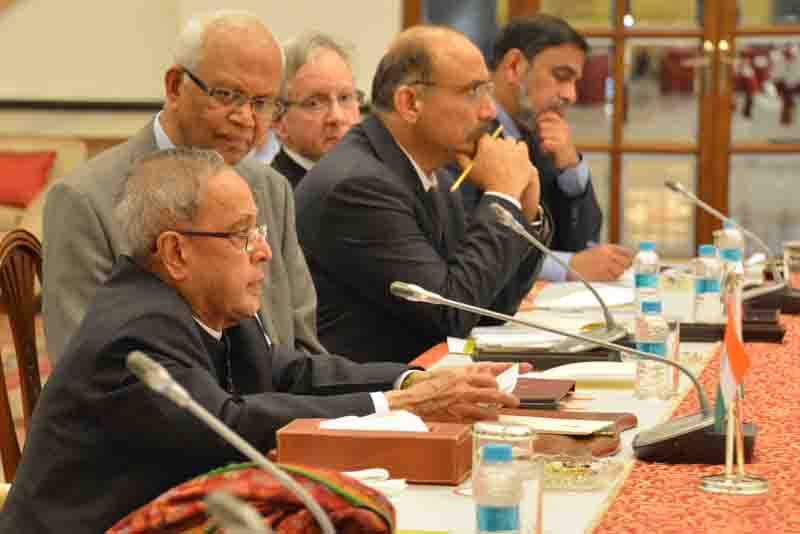
1.At the outset, I extend a warm welcome to the distinguished national and international participants of this Global Round-table on Inclusive Innovations. I have listened with interest the summary of outcomes of the discussions that took place in this forum, as presented by Prof. Gupta. I also thank the two distinguished delegates for sharing their perspectives. This topic, according to me, is pertinent for any nation desirous of ensuring inclusive development for all sections of society through innovation.
Ladies and Gentlemen:
2.India has had a long tradition of grassroots innovation.From time to time, the common people in this country have ushered in novel solutions to overcome their day-to-day difficulties.The drivers that influence the pursuit of innovation are many – from basic survival to propulsion of growth.A healthy eco-system is needed for harnessing the innovative potential of various segments in different sectors and at multiple levels in our society.
3.Creating an inclusive eco-system calls for linkages between grassroots innovators on the one hand, and academic institutions and market forces, on the other. Countries successful in building such a network have become innovation leaders. As an attempt to bring educational institutions and grassroots innovators within the ambit of an inclusive innovation system, a programme for Innovation Scholars In-Residence was started in Rashtrapati Bhavan last year. I am glad that the second batch of innovation-scholars has joined us today. During their two-week stay at the Rashtrapati Bhavan, they will be mentored and connected with relevant stakeholders to give wings to their ideas.
Ladies and Gentlemen:
4.Educational institutions have a critical role to play in nurturing innovations in the society. India, with a large network of 713 universities and over 36,000 colleges, is poised to play a leading part in developing an innovation eco-system. To catalyze the institutions of higher learning in this process, I have been urging the leaders of the higher education sector to establish a connection between their institutes and grassroots innovations in their hinterland, and to also set up Innovation Clubs. Youth power has to be galvanized for nation-building. Thus, the students have to be encouraged tosensethe unmet needs of the common man, and search, spread and celebrateinnovations.The members of these Innovation Clubs are participating in the Festival of Innovation, which is taking place for the first time in Rashtrapati Bhavan. The presence of distinguished participants from India and abroad will definitely provide a global platform to all the innovators and participants of this important Festival.
5.Many outstanding social, educational and corporate leaders present here have pioneered initiatives aimed at taking the Indian grassroots story forward.Our traditional knowledge has contributed to the introduction of many popular ayurvedic medicines and other such products.At the same time, modern applications of science and technology have increased livelihood opportunities for the people. A significant breakthrough in our march towards development and progress is possible; but with challenges, to overcome which, a collaborative effort of all stakeholders is necessary.
6.Noble Laureate Prof. Yunus had created an outstanding model for micro-finance that has led to the emancipation of poor in developing countries.To my mind, the next major breakthrough will come through micro venture innovation finance, which has been pioneered by the Honey Bee Network and National Innovation Foundation.By partnering with companies and colleges in India and abroad, our grassroots innovators will propel a different kind of globalization.The products and services based on grassroots knowledge and creativity will reach global markets in an affordable, accessible and accountable manner.
Distinguished participants:
7.The Union Minister of Science and Technology, Dr. Harshvardhan, is spearheading the scientific and technological strategies for an inclusive growth under the leadership of the Prime Minister, Shri Narendra Modi. The Make in India, Clean India, and Inclusive India, under which financial inclusion is of prime essence, needs a significant push. Many amongst you have shared your experiences about how your countries and institutions have made progress in the direction of inclusive innovation. I am also happy at the interest evinced by you to engage with stakeholders from India. Some of you will share your insights tomorrow as well. You may take this opportunity to give your valued suggestions for a strategic roadmap for India to become much more inclusive and innovative.I assure you of our highest consideration for your suggestions and ideas.
8.An ‘Atal Innovation Mission’ as an Innovation Promotion Platform involving academics, entrepreneurs and researchers has been announced recently. It will draw upon national and international experiences to foster a culture of innovation, R&D and scientific research in India. The platform will also promote a network of world-class innovation hubs to address the grand challenges of our country. I call upon you to participate in the Indian development story, which will exhibit frugal and sustainable pathways for other countries and communities. In this era of globalization, the Indian innovations and development will not only benefit India but the rest of the world as well. The ingenious goods and services developed through inclusive innovation, and by blending affordability, accessibility, acceptability and availability, will have the potential to transform the global landscape.
9.In the end, I do hope that your interactions with various innovators at this forum are productive and trigger long-term partnerships for peace, progress and prosperity in the world. I wish a pleasant stay to the visiting dignitaries from abroad. I invite you all to visit the Mughal Gardens at Rashtrapati Bhavan. I wish you the very best for the future.
Thank you.
Jai Hind.
